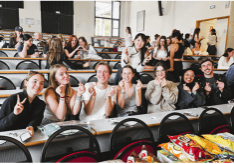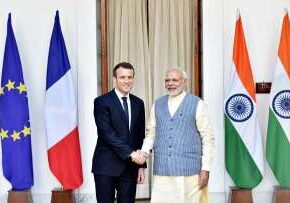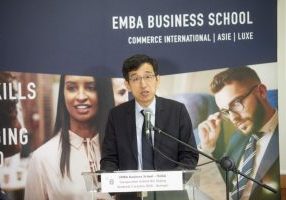On 13 February 2023, the EMBA Business School had the pleasure and honour to welcome Mr. SONG Young-Gil, former Member of Parliament of South Korea and currently Visiting Professor and Senior Research Fellow at ESCP Paris, for a lecture.
His talk to the ISUGA students was on “The impact of the war in Ukraine from the Korean perspective”. In advance of his lecture, the school’s communication team asked him a few questions ⤵

Mr SONG, you are currently a teacher-researcher at ESCP Paris. So you must be starting to have some “experience” of French students… In your opinion, are Korean and French students different?
The French system seems to me to be more about logical thinking and independent thinking. Whereas in the South Korean education system, we have to learn by rote and accumulate information. So logic and independent thinking are weak here, which is more the advantage of French students.
How do you think relations between South Korea and Europe are developing?
European countries are among the three largest economic communities, the first being the United States, followed by China and Europe. South Korea is an important trading partner for Europe. We have already put in place all the elements of a free trade agreement. So, day by day, we are increasing trade between the two sides. But usually it is the politician who has the legal experience and knowledge of European countries. Usually, as in my case, politicians use their sabbatical year to go to the United States and China, and then to Europe where they go to Germany because they want to study the German reunification process. But since I have come to France, I am taking advantage of this precious time to understand European countries and their economies, in particular the relationship between France and Korea. Regarding our food practices, we have similar expectations: for example, cheese and kimchi, as well as soy, are important and deeply linked to the culture. This taste and culture of food allows us to exchange, create opportunities and strengthen the relationship between the two countries.
What issues are you looking at in your comparative observation of France and South Korea?
I am very interested in the birth rate. As you know in Korea the birth rate is very low. We have a big problem with that, because it is only 0.79%. The Japanese are also very concerned about the low birth rate, but now their birth rate is 1.3%. I heard that among all European countries, France is leading in birth rate. About 1.9%. That’s pretty amazing, so we wonder how we can overcome this problem. That’s the main reason why I stay in France.
Then there is the climate crisis. I want to know what is happening with the carbon border mechanisms, the carbon adjustments. We should study the carbon texts in order to access the European market.
The nuclear era is also very promising in France and South Korea. Nuclear generation is well developed for both our countries, but the issue of nuclear waste treatment is still very important and urgent. I also want to study the use of pure energy in relation to nuclear energy through a very well-developed process so that we can convert in this field. ITER, the world’s largest experimental nuclear fusion reactor, is located in Provence, in the south of France. I plan to visit it to understand its operation and potential.
What do you think of the ISUGA programme at EMBA Business School?
I am very surprised that this Breton province is interested in Korea, China and Japan. The teaching here is very amazing! I know this programme now, so when I go back to Korea, I will present this education and point out that these French students can speak Korean, know Korean culture and history. I will advertise it to future employers!








